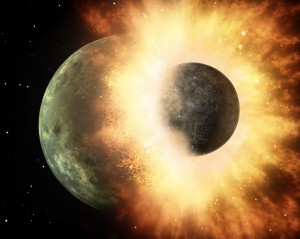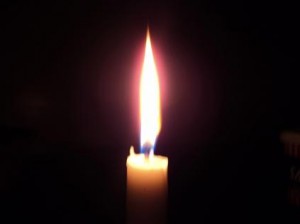Each month, Cat and I light candles in observance of the full moon and in honor of the Mother Goddess, for whom the moon is a symbol. It’s a practice taught to us by our Wiccan teachers about twenty years ago and one we still follow even after thirteen years in the Society of Friends. Looking up at the sky this past month, I found myself thinking about how people have been looking up at the moon with wonder and following its cycles since before we were fully human. In a sense, we’ve been doing this forever.
This year at school I’ve been teaching an astronomy unit for the very first time, and as I lit my candle this month I was also thinking about the origin of the moon. Four and a half billion years ago the planet Theia, about the size of Mars,  collided with the Earth. Theia disintegrated completely, Earth’s crust was melted, and the Earth’s axis was knocked into its23½ degree tilt, giving us the seasons. If there was life on Earth back then, it was obliterated. Enough matter from both planets was ejected into orbit to coalesce intoour moon.
collided with the Earth. Theia disintegrated completely, Earth’s crust was melted, and the Earth’s axis was knocked into its23½ degree tilt, giving us the seasons. If there was life on Earth back then, it was obliterated. Enough matter from both planets was ejected into orbit to coalesce intoour moon.
So the moon is not forever. Worlds are born and die. All of creation is like drawing with paint dribbled onto the surface of moving water. Constant creation, constantly swept away.
What kind of a God would have conceived of a universe like this one? What God would give us reproduction and evolution instead of immortality?
A God of constant creation.
Of course, I say “God,” fully aware of how undefined that word is. Did God create the universe, or does God arise from the universe? It does not matter. We cannot know for sure, but creation makes a good enough metaphor even if God is part of the universe, is contained within the universe, because either way—creator or manifestation—the relationship is equally intimate, the fit between them equally aligned.
Is God one or many? Male or female? Gendered and personal or more like an electrical field? It does not matter. God is all of those, and for now, “God” is the most generic word I can think of. Attempts to be more inclusive, with terms like “Ground of All Being” or “the Divine” or even “Spirit” have come to sound unwieldy and overly precious in my ears.
What God is not is jealous. Any God who says “I am a jealous God” is so small, so limited as to be cut off from much of what God is. Elohim and YHVH are aspects of God, but they are not how God connects with me.
So how does God connect with me? “Worship” is a word whose meaning has changed since the advent of Quakerism. Worship for most people, for most religions, meant and still means adoration. Praise. Obeisance. Declarations of loyalty and love. We “worthily magnify your holy Name.” (Book of Common Prayer, 1979)
Worship for Quakers means spiritual communion, the direct experience of the Holy Spirit. Worship means listening with enough openness that the indwelling Spirit, the Inward Teacher, begins to vibrate in a resonant frequency with God. At its most intense, Quaker worship means speaking with the voice of God—an experience as literal and powerful as drawing down the moon in a Wiccan circle.

And yet I say “God,” and the word has no specific meaning. Rather, it acts as a wick, drawing our liminal andtranscendent experiences up into the flame of language, letting us talk about it. But the wick is not what burns, and the word is not what means.
















